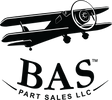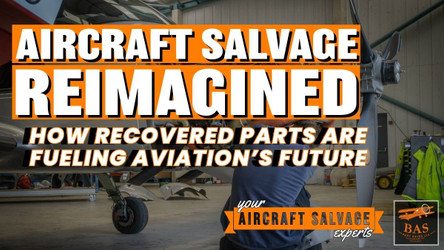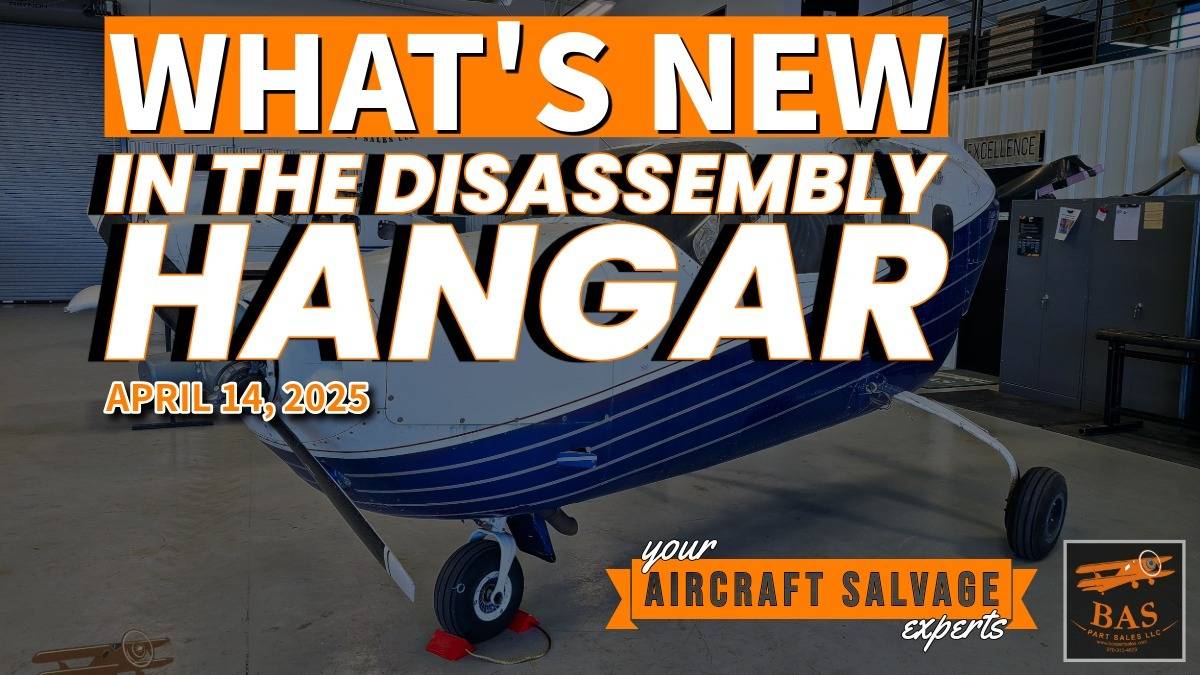Aircraft Salvage Reimagined: How Recovered Parts Are Fueling Aviation’s Future
Posted by Clinton McJenkin on Apr 17th 2025
When people hear "aircraft salvage," they often picture wreckage or scrap—but the reality is far more valuable. At BAS Part Sales, we’re on a mission to change the way the aviation world sees salvage. Far from being a last resort, salvaged parts are a smart, sustainable, and trusted solution for keeping aircraft flying safely and affordably. In this article, we’ll break down what salvage really means, how the process works, and why more pilots, mechanics, and operators are turning to as-removed parts backed by real-world guarantees.

Redefining Aviation Salvage:
The Vital Role of Recovery and Reuse in Today’s Aircraft Industry
When most people hear the word "salvage" in the context of aviation, their minds often leap to images of wreckage—twisted fuselages, tragic headlines, or forgotten graveyards of aircraft left to decay. It's an image rooted in misunderstanding, and at BAS Part Sales, we're here to flip the narrative. Aircraft salvage isn’t about loss - it’s about opportunity, innovation, and sustainability.
In fact, aviation salvage is one of the most essential, dynamic sectors in the aerospace industry today. It's the art of breathing new life into grounded aircraft, turning yesterday’s machinery into tomorrow’s critical parts. At BAS Part Sales, salvage isn’t an end—it’s a beginning.
Understanding Aircraft Salvage: More Than Meets the Eye
Aircraft salvage involves recovering, inspecting, disassembling, and reselling viable parts from decommissioned, damaged, or retired aircraft. But this isn't a haphazard process. It’s highly regulated, technically meticulous, and underpinned by industry-wide standards set by bodies like the FAA and EASA.
Think of salvage as aerospace recycling—just with a lot more precision and oversight. A salvaged aircraft might yield hundreds or even thousands of usable components, from engines and avionics to seats, panels, landing gear, and more. Each part has a second life waiting, and in many cases, it’s indistinguishable in function and reliability from brand-new OEM parts.

Quality and Compliance: Confidence Without Compromise
One of the most persistent myths surrounding aircraft salvage is that used parts carry unnecessary risk. At BAS Part Sales, we work hard to replace that myth with confidence and clarity.
We don’t “inspect” parts in the technical FAA-regulated sense, and we don’t “certify” them either—because those processes are the responsibility of the licensed mechanics, repair stations, or overhaul shops who install them. What we do is offer straightforward, transparent, and reliable parts, exactly as they were removed from the aircraft.

That’s why most of our parts are sold “as-removed” and come with a 90-day satisfaction guarantee. If a part doesn’t meet your mechanic’s standards, or if your repair station or overhaul facility determines it’s not fit for service, you can return it within 90 days for a full refund.
This isn’t just about policy—it’s about trust. We understand that buying used aircraft parts online requires assurance. So rather than dressing things up with misleading jargon, we keep it real:
- We document everything clearly, including photos, part numbers, serial numbers, and known conditions.
- We ship quickly and carefully, so parts arrive ready for your next steps.
- We stand behind our parts, with a no-hassle return process if they don’t pass your professional evaluation.
You can read the full details of our return policy here, but the bottom line is this: we want you to feel 100% confident shopping with us. If your mechanic doesn’t like it, send it back—no questions asked.
Salvage doesn’t mean “lesser”—it means cost-effective, and often life-extending for the aircraft that receive these components. It enables general aviation pilots, fleet operators, and maintenance teams to access high-quality parts without waiting on long lead times or paying premium prices for new production.
At BAS Part Sales, quality doesn't mean a stamp or a certificate, it means honesty, traceability, and service you can rely on.
A Growing Demand in a Shifting Industry
The aviation industry is evolving rapidly. As global supply chains fluctuate, the demand for reliable, readily available parts has never been higher. Salvaged components fill a critical gap in the market, helping keep aircraft flying and fleets operational—especially for legacy models no longer supported by manufacturers.
Aircraft owners and maintenance shops across the world turn to companies like BAS Part Sales not only for affordability but for trust. Our inventory is built on a foundation of traceability, honesty, and a deep respect for aviation heritage. Whether you're restoring a classic Cessna or maintaining an active Piper fleet, chances are you’ll find what you need in our salvage-sourced inventory.
Sustainability in Aviation: Salvage as a Green Solution
Sustainability is more than a buzzword—it’s a mandate for the future of aviation. Every salvaged part that goes back into service means one less component has to be manufactured from scratch. That translates to reduced raw material extraction, less energy consumption, and a lower carbon footprint across the industry. And almost nothing goes into a landfill. Unusable parts and components go to recycling more often than they go in the trash bin.
By giving components a second life, the salvage industry actively contributes to circular economy practices in aviation. At BAS, we’re proud to be part of that shift. Every part we reclaim and redistribute is one small victory for the planet.



Behind the Scenes: The Art and Science of Salvaging Aircraft
Salvaging an aircraft is both a technical operation and a strategic one. Our process typically involves:
It’s a process that blends technical expertise with real-world insight into aviation trends, demand cycles, and regulatory standards. It’s not just wrench-turning—it’s a mission.
Changing Perceptions: The Human Side of Salvage
At BAS Part Sales, we don’t just move parts—we tell stories. Each salvaged aircraft has a history. Some have crossed oceans. Others have served generations of pilots. Our team works hard to document and share these stories through our videos, blogs, and community engagement.
We're passionate about educating pilots, mechanics, and aviation enthusiasts about the value of salvage. From YouTube breakdowns of new arrivals to behind-the-scenes looks at our teardown process, we aim to make the world of aircraft salvage transparent, accessible, and yes—even exciting.
We're not here to just sell parts—we're here to celebrate the legacy of every aircraft we touch.

Why BAS Part Sales?
With decades of combined experience and a deep bench of aviation knowledge, the BAS team is trusted across the globe for quality salvage parts. But what really sets us apart is our commitment to transparency, service, and community.
- Massive Inventory: Hundreds of thousands of parts in stock, online, ready to ship, and updated daily.
- Global Shipping: We ship worldwide with care and speed.
- Expert Support: Our team of aviation professionals is always ready to help.
- Community Focused: We support aviation education, share teardown videos, and connect with enthusiasts around the world.
When you shop with BAS, you’re not just getting a part—you’re becoming part of a movement to reshape how the world views aviation salvage.
The Future of Salvage: Bright, Bold, and Sustainable
As the industry continues to grow and modernize, aircraft salvage will only become more important. From extending the life of general aviation fleets to reducing environmental impact and making flying more accessible, salvage is the unsung hero of the skies.
And we’re proud to lead the charge.
So next time you hear the word salvage, don’t think of scrap yards—think of innovation. Think of sustainability. Think of BAS.

Clinton McJenkin
Sales & Marketing Director
BAS Part Sales




